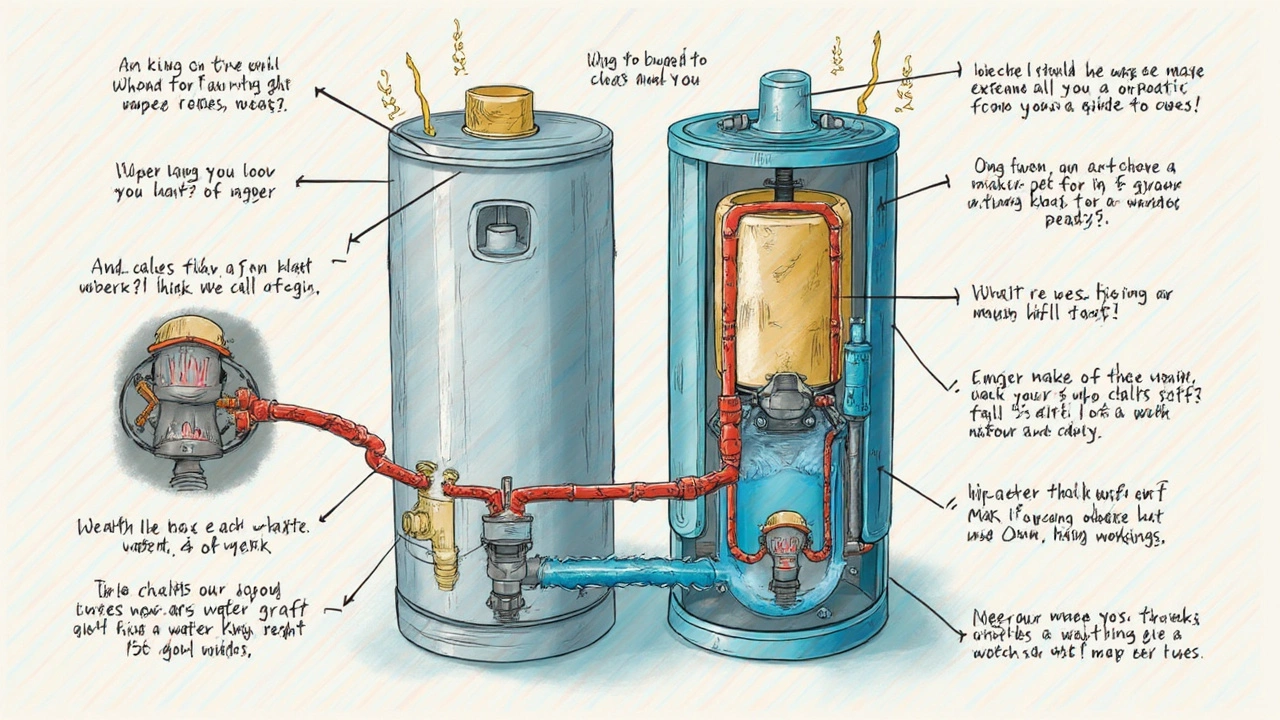So, your hot water heater's acting up, and you're left wondering if a cold shower is your new reality. Fixing it could take anywhere from a quick hour to a frustrating few days, depending on what's gone wrong. Minor issues like a broken thermostat might be sorted in a flash, while something like a tank leak could mean waiting on parts and more hassle.
Before you roll up your sleeves or dial the repair guy, let’s talk about what's under that water heater hood. Do you know what type of heater you've got? Electric or gas, each has its quirks and common problems. Knowing this can make a world of difference in understanding what’s ahead.
Factors like the complexity of the issue, availability of parts, or even the repair expert's schedule play a role in the timeline. We'll break it down, so you have a better idea of what you're dealing with and can plan your day (or week!).
- Understanding Common Water Heater Problems
- Factors Affecting Repair Time
- Step-by-Step Repair Process
- When to Call a Professional
- Tips for a Smooth Repair Experience
Understanding Common Water Heater Problems
When your hot water heater is on the fritz, knowing what might be wrong can save you a lot of headache. Most of the time, water heaters break down due to a handful of common issues.
The most usual suspect is a faulty thermostat. If your water isn't hitting the right temperature, it could be due to a malfunctioning thermostat. Fortunately, fixing a thermostat isn't usually much of a hassle.
Another frequent issue is sediment build-up. Over time, minerals in your water can settle at the bottom of your tank, especially if you have hard water. This build-up can block pipes, reduce efficiency, and eventually lead to a tank leak if ignored.
Leaky water tanks are a pain. These can happen due to rust or physical damage. If you spot water pooling at the base of your heater, you might be dealing with a leak. Leaks are trickier to fix and often mean you're looking at either a new tank or some serious repairs.
Ignition problems are a headache for gas water heaters. If there's a problem with the pilot light or the ignition system, you might find yourself out of hot water—and fast.
Electric heaters have their own quirks too, like tripped circuit breakers or blown fuses. If your heater suddenly stops working, it's wise to double-check your power source before calling anyone in.
Here's a quick reference table for common problems and potential solutions:
| Issue | Possible Solution |
|---|---|
| Thermostat malfunction | Thermostat replacement |
| Sediment build-up | Tank flushing |
| Tank leakage | Inspect and repair or replace the tank |
| Ignition problems | Check and fix pilot light/ignition system |
| Power issues (electric) | Check circuit breaker or replace fuses |
Understanding these common issues can help you decide if you're up for a DIY fix or should call in a professional repairman.
Factors Affecting Repair Time
Not all hot water heater issues are created equal, and neither is the time they take to fix. The complexity of the problem is a major factor. If it's something straightforward like a thermostat repair or a heating element replacement, you might be looking at just a couple of hours. But, if your water heater's got a serious leak or requires a full replacement, settle in for a longer haul.
Another biggie is whether you've got an electric or gas hot water heater. Gas heaters, with their venting systems and burner assemblies, often have a bit more going on, potentially needing more time to troubleshoot and repair.
You also have to consider the repair pro's schedule. If they're swamped, you might wait a bit before they can even get started. Weekend requests can add even more time, depending on whether technicians are available.
Here’s a little insider scoop: Sometimes, the delay isn’t about the repair itself but waiting for the right parts. If your water heater’s older or less common, parts might need to be ordered.
| Repair Type | Average Time |
|---|---|
| Thermostat Replacement | 1-2 hours |
| Heating Element Repair | 1-3 hours |
| Tank Leak Fix | 1-3 days (parts needed) |
| Entire Heater Replacement | 2-4 days (including setup) |
The brand and model of your heater can also surprisingly affect time. Some brands are easier to work with due to better design or part availability.
Understanding these factors helps manage your expectations. You'll be better prepared to handle whatever timeline you're facing and even save yourself some stress along the way!

Step-by-Step Repair Process
Alright, tackling a hot water heater repair might sound daunting, but breaking it down into steps can make things a lot clearer. Here's a straightforward guide to help you get through the process, whether you're doing it yourself or just want to know what's happening while a pro is on the job.
- Identify the Problem: First things first, you need to figure out what's wrong. Is the water not heating up? Is there a pool of water beneath your tank? Different issues have different solutions, so identifying the right problem is key.
- Gather Tools and Parts: Depending on the issue, you might need specific tools. A multimeter is handy for electrical issues, while a wrench might be needed for plumbing fixes. Know your water heater type too, as an electric heater requires different parts than a gas one.
- Shut Off Power and Water: Safety first! Turn off the power supply if it's electric, or shut off the gas if it's a gas heater. Don't forget to turn off the water supply to the heater as well to avoid any accidents.
- Repair or Replace Parts: Now onto the actual fixing. Common issues are a faulty thermostat or heating element for electric heaters and pilot light problems for gas ones. Once you've identified the faulty part, repair or replace as necessary.
- Reassemble and Test: After making the fixes, it's time to put everything back together. Reconnect any parts you took off, turn the power and water back on, and fire it up. Watch closely to ensure everything is running smoothly without leaks or strange noises.
If you're not really into DIY or the problem seems too complex, don't hesitate to call a professional. It might save you time, frustration, and possibly a bigger bill down the line.
Here's a quick look at how often different parts tend to fail. This might help in understanding what could go wrong based on the age of your heater:
| Component | Typical Lifespan |
|---|---|
| Heating Element | 6-10 years |
| Thermostat | 10-12 years |
| Anode Rod | 3-5 years |
Knowing the process helps take away a bit of the mystery. Whether you're going it alone or calling a pro, having a clue about what to expect means you're already ahead of the game.
When to Call a Professional
Alright, no shame in waving the white flag when it comes to your hot water heater repair. Here’s when you’ll definitely want to bring in the pros. If your heater has signs of a leak, makes strange noises, or you have no hot water at all, it's time to think about calling someone who knows what they're doing.
Why a pro? While some fixes are easy (like changing a thermostat), problems like leaking tanks, erratic temperatures, or consistent tripping of the breaker require diagnostic skills that a pro has honed over years. Attempting these repairs without the right expertise might actually make things worse.
When considering calling for help, look at these key moments:
- No Hot Water: If you've checked your pilot light and breaker, and there’s still no hot water, it could be a serious issue like a faulty heating element.
- Rusty Water: Brown or rusty water can mean your tank is rusting inside, and it's best checked by a technician.
- Strange Noises: Rumbling, popping, or banging sounds can signal sediment build-up or even impending failure.
- Water Leaks: Not all leaks are tank related, but a professional can pinpoint the problem accurately.
Also, keep in mind that routine maintenance and inspections by a professional can prolong your heater's life and save you some dough in the long run. Many leaks or noises can be prevented with simple annual check-ups and flushes.
Don't forget, certain repairs, especially involving gas heaters, need a certified technician for safety reasons. It's one of those moments where shelling out some cash upfront might save you lots more down the line.

Tips for a Smooth Repair Experience
Dealing with a hot water heater repair doesn't have to be a headache. A few smart moves can make the process a breeze. Here's how to sidestep some common pitfalls and get things fixed without breaking a sweat.
First off, know your water heater's make and model. Having this info handy can save tons of time when you or a pro are diagnosing the problem. It also helps when you're ordering parts or explaining issues over the phone.
Next up, decide if the issue is something you can handle on your own. For instance, resetting a tripped circuit breaker is a quick DIY fix. But, if the issue involves gas elements or internal parts, it’s best to call in a professional.
When calling a repair service, ask about their availability and turnaround time for parts. This way, you can better gauge how long you'll be without hot water. Don’t be shy to get a quote upfront—a little digging around for quality service at a fair price pays off.
Here are some quick tips to ensure everything goes smoothly:
- Prepare the Area: Clear any clutter around the heater so the repair tech has easy access. It saves time and could even cut down your bill.
- Safe Storage: If your heater is in a tight spot, move items that could get wet or damaged during repair.
- Ask Questions: Use the time with the technician to learn about proper maintenance so future issues can be avoided.
And here’s a quirky stat to ponder: Did you know that up to 12% of home utility bills can come from heating water? A speedy repair means getting back to energy efficiency faster, and saving some bucks along the way!
By being prepared and informed, you not only get your water heater fixed faster but you also enrich your understanding of home maintenance. It's a win-win!


